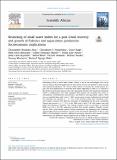Files in this item
Restocking of small water bodies for a post Covid recovery and growth of fisheries and aquaculture production : socioeconomic implications
Item metadata
| dc.contributor.author | Aura, Christopher Mulanda | |
| dc.contributor.author | Nyamweya, Chrisphine S. | |
| dc.contributor.author | Njagi, Grace | |
| dc.contributor.author | Mwarabu, Ruth Lewo | |
| dc.contributor.author | Ongore, Collins Onyango | |
| dc.contributor.author | Awuor, Fonda Jane | |
| dc.contributor.author | Keyombe, James Last | |
| dc.contributor.author | Musa, Safina | |
| dc.contributor.author | Awandu, Hezron | |
| dc.contributor.author | Awoko, Winnie | |
| dc.contributor.author | Macharia, Sammy | |
| dc.contributor.author | Abila, Richard Oginga | |
| dc.date.accessioned | 2023-01-04T13:30:06Z | |
| dc.date.available | 2023-01-04T13:30:06Z | |
| dc.date.issued | 2023-03-01 | |
| dc.identifier | 282290679 | |
| dc.identifier | 1f18ae56-9216-42fe-bc01-25fec591e385 | |
| dc.identifier | 85143784867 | |
| dc.identifier | 000901585700009 | |
| dc.identifier.citation | Aura , C M , Nyamweya , C S , Njagi , G , Mwarabu , R L , Ongore , C O , Awuor , F J , Keyombe , J L , Musa , S , Awandu , H , Awoko , W , Macharia , S & Abila , R O 2023 , ' Restocking of small water bodies for a post Covid recovery and growth of fisheries and aquaculture production : socioeconomic implications ' , Scientific African , vol. 19 , e01439 . https://doi.org/10.1016/j.sciaf.2022.e01439 | en |
| dc.identifier.issn | 2468-2276 | |
| dc.identifier.other | RIS: urn:75C1823BFC82DBA63436C22237F5933A | |
| dc.identifier.uri | https://hdl.handle.net/10023/26666 | |
| dc.description | Funding: The International Fund for Agricultural Development (IFAD) and The Government of Kenya through the Aquaculture Business Development Programme (ABDP) funded the restocking and data collection and processing. | en |
| dc.description.abstract | Restocking of fish in Small Water Bodies (SWBs) is one of the technologies that can be used to enhance fish-food production for post Covid recovery and growth in food security, and national development. The current study aimed at assessing the socioeconomic impact and stock performance of restocked Nile tilapia fingerlings in SWBs in 15 counties in the Western and Central regions where the Aquaculture Business Development Programme (ABDP) is implemented. The study employed both primary and secondary data from socioeconomics, environmental characteristics and fisheries and aquaculture aspects. There was no restocked dam with a low (< 1.66) socioeconomic impact, indicating the potential for restocking. The majority (n = 27; 79%) of the restocked SWBs had a moderate (1.66 – 2.33) impact, owing to the inherent constraints of adoptability by the local community. Twenty one percent (n = 7; 21%) of the SWBs had a high (2.34 - 3.00) impact and with better environmental conditions. The average condition factor (K) of tilapia in restocked SWBs was 1.24 ± 0.53 SD, suggesting excellent fish growth condition. Notably, restocking the SWBs could benefit riparian fishing communities by improving their livelihoods and providing food and nutritional security. Given the limited exploitation of fish in most SWBs in the developing countries, additional community awareness and capacity building interventions are needed to enhance optimal use of SWBs in post Covid era. | |
| dc.format.extent | 11 | |
| dc.format.extent | 1455198 | |
| dc.language.iso | eng | |
| dc.relation.ispartof | Scientific African | en |
| dc.subject | Small water bodies (SWBs) | en |
| dc.subject | Socioeconomic impact | en |
| dc.subject | Restocking | en |
| dc.subject | Post Covid | en |
| dc.subject | Kenya | en |
| dc.subject | QH301 Biology | en |
| dc.subject | SH Aquaculture. Fisheries. Angling | en |
| dc.subject | E-DAS | en |
| dc.subject | SDG 2 - Zero Hunger | en |
| dc.subject | NIS | en |
| dc.subject | MCC | en |
| dc.subject.lcc | QH301 | en |
| dc.subject.lcc | SH | en |
| dc.title | Restocking of small water bodies for a post Covid recovery and growth of fisheries and aquaculture production : socioeconomic implications | en |
| dc.type | Journal article | en |
| dc.contributor.institution | University of St Andrews. School of Biology | en |
| dc.identifier.doi | https://doi.org/10.1016/j.sciaf.2022.e01439 | |
| dc.description.status | Peer reviewed | en |
This item appears in the following Collection(s)
Items in the St Andrews Research Repository are protected by copyright, with all rights reserved, unless otherwise indicated.

